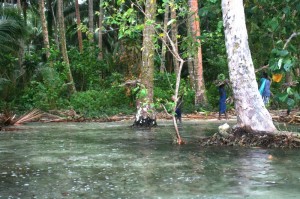Climate change: re-branding a crisis
Did you know that “global warming” is too depressing to talk about these days? Yep, it’s true. Instead, we can call it “our deteriorating atmosphere,” like it’s a beloved old relative who’s begun the unavoidable aging process. And “energy efficiency” just sounds scary. Instead, it’s all about “saving money for a more prosperous future.”

While we’re at it, there’s got to be a more upbeat way to talk about people in the world’s most vulnerable communities, who bear the brunt of the effects of climate change. Instead of poor, perhaps we could call them “those of lesser wealth.” And the Carteret Islanders of Papua New Guinea, whose homes are disappearing due to rising sea levels? They’re just in the wrong place at the wrong time–or in other words, “locationally challenged.”
OK, so I made up the last couple of examples. But the first two come from a very real recent attempt to re-brand climate change to make it more palatable to the public.
According to a story in the New York Times, the nonprofit marketing firm EcoAmerica has been conducting focus groups and surveys about global warming for the last several years. Their goal: to “find new ways to frame environmental issues and so build public support for climate change legislation and other initiatives.”
The Times quotes many of their recommendations, including this one:
Remember to speak in TALKING POINTS [sic] aspirational language about shared American ideals, like freedom, prosperity, independence and self-sufficiency while avoiding jargon and details about policy, science, economics or technology.
As a writer, I believe EcoAmerica is doing vital work; words are indeed an important tool that can inspire people to action. A lot of my job involves finding the right language for the right audience, while knowing that the wrong words can keep people from hearing the substance of your message.
But still: Since when are scientific and economic realities merely “jargon” and “details”? Obviously you don’t want to inundate people with pure scientific data, but when it comes to climate change, the facts speak for themselves. By avoiding the realities of the issue–like the fact that 40 percent of the world’s population will face water shortages by 2025–and peddling warm fuzzy terms like “self-sufficiency” and “prosperity,” you’re risking a dangerous oversimplification of a real and urgent problem.
Interestingly, a new US poll commissioned by Oxfam and Faith in Public Life found that both the general public and religious groups like Catholics and evangelicals support addressing the human consequences of climate change. For example, three-quarters of those surveyed favor “helping the world’s poorest people adapt to food and water shortages caused by rising global temperatures.” Sounds pretty factual to me.
But what do you think: When you read about climate change, what motivates you to act? The facts about what’s actually happening around the world? Or some nice-sounding words about peace, freedom, and “a more prosperous future”?